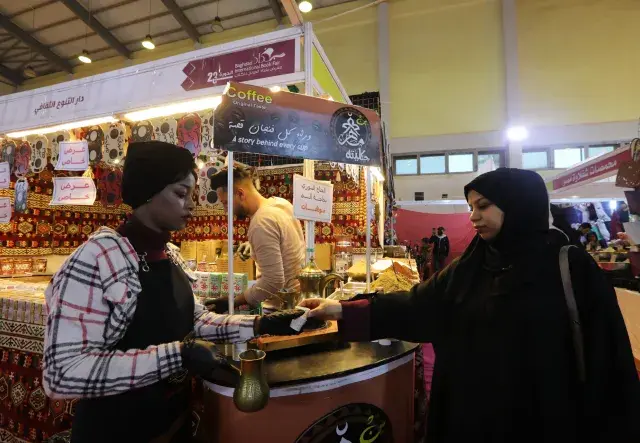Nurturing Peace: Women and Youth Shaping Iraq's Social Cohesion

Iraq, a nation with a rich and intricate history, is a blend of diverse communities and ethnicities. This land, also known as Mesopotamia and situated in the heart of the Middle East, has stood at the crossroads of civilizations for millennia. Iraq's social fabric is intertwined with the diversity of various ethnic groups, including Arabs, Kurds, Turkmen, Assyrians, Yazidis, and more, creating a melting pot of cultures and identities. However, this diversity has often been a two-edged sword, contributing to both the nation's vibrancy and its fragility.
Currently, the country is actively engaged in rebuilding and reconciling its diverse communities, fostering social cohesion, and addressing the legacy of conflict. In the shadow of a tumultuous past, Iraq emerges as a resilient nation striving for peace, stability, and social cohesion. Illuminating the extraordinary contributions of women and youth in the ongoing peace-building efforts.
The Youth of Iraq: Leaders of Unity, Peace and Social Cohesion
The young people of Iraq, constituting a substantial portion of the population, have emerged as the architects of a brighter future. According to the Institute for International Education's Open Doors Report in 2022, Iraq boasts a youthful demographic, with over 60% below the age of 25. These young minds, marked by past hardships but propelled by a vision of unity, have embraced the role of change-makers. Their involvement in grassroots initiatives, advocacy campaigns, and community-driven projects has cultivated a sense of belonging and cohesion.
Youth unemployment has been a persistent challenge in Iraq. As of 2021, the youth unemployment rate in Iraq was approximately 17.3%, underscoring the imperative to address economic opportunities for young people as part of social cohesion efforts.
Conversely, the younger generation, a demographic powerhouse, actively seeks ways to rebuild a fractured society. Their initiatives range from organising cultural exchange programmes to promoting tolerance and understanding among different ethnic and religious communities. An inspiring example of this is the youth initiatives, a group of passionate young Iraqi men from various Iraqi cities. Recognizing the urgent need for community rebuilding, these groups of young volunteers embark on grassroots projects aimed at revitalising their communities. Together, they have undertaken tasks such as cleaning up neighbourhoods, repurposing damaged buildings into community centres, and organising cultural events that celebrate the rich diversity of residents. These volunteer groups' unwavering dedication to community rebuilding has not only delivered essential services to fellow citizens but also provided a platform for youth to collaborate in a spirit of cooperation and cohesion. These efforts have not only contributed to physical reconstruction but have also played a significant role in the social and emotional healing of cities that have endured substantial trauma.
This story highlights the resilience, determination, and creativity of Iraqi youth in their efforts to promote peacebuilding and social cohesion in a post-conflict environment. They serve as a testament to the transformative power of young individuals actively working towards a more united and harmonious Iraq.
Resilient Women of Iraq, Pioneers of Peace and Social Cohesion
Women's involvement in peace-building efforts is not merely anecdotal; it is grounded in tangible data. According to the Institute for Economics and Peace (IEP), countries with greater gender equality are less likely to experience armed conflict. The empowerment of women in Iraq is correlated with a significant reduction in violent incidents. Additionally, youth-led peace initiatives have helped lower crime rates and decrease the influence of extremist groups, creating more stable communities.
The narrative of Iraqi women in the realm of peacebuilding and social cohesion is closely interwoven with the tireless efforts of figures like Yanar Mohammed, a resilient and unwavering advocate for women's rights. Co-founding the Organization of Women's Freedom in Iraq (OWFI) amidst the tumultuous aftermath of the Iraq War, Yanar took a firm stand against the systematic oppression faced by women in her homeland. Her work within OWFI has provided critical aid to over 15,000 women affected by violence, displacement, and discrimination, offering not only shelter and legal support but also vocational training for empowerment.
Operating in a highly challenging environment, Yanar faced risks and challenges due to her outspoken advocacy. Her resolute dedication illustrates the vital importance of recognizing the contributions of Iraqi women in rebuilding their nation, with Yanar standing as an emblematic figure, not just for Iraq but for women's rights globally. Her work has resonated far beyond the borders of her country, shedding light on the critical role women play in peacebuilding and social cohesion. Yanar Mohammed's story stands as a testament to the immeasurable impact women can have in shaping a more just and peaceful society, exemplifying that the inclusion and recognition of women's rights are foundational to the pursuit of a stable and equitable Iraq.
This article was written by Fatima Oleiwi and is licensed under CC BY-NC 4.0.



